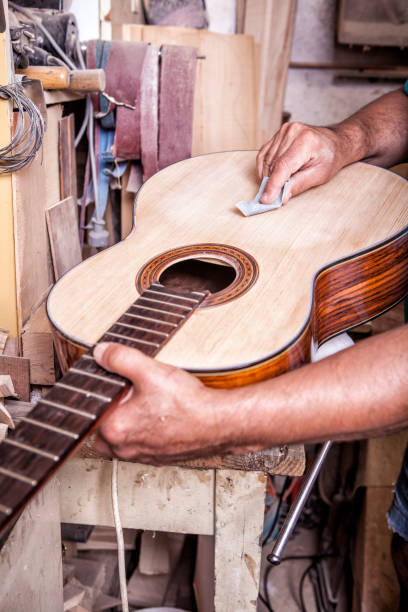A guitar luthier, a skilled craftsman, is someone who repairs and makes guitars. As with most music careers, you don’t learn the trade of luthier overnight. The work of a guitarist luthier may be rewarding for those who have a creative mind and are good at tinkering. We’ll discuss a guitar luthier and how you can get started.
What’s a Guitar Luthier?
A general luthier is a craftsman who repairs and makes stringed instruments. Many luthiers are skilled in one type of instrument. A guitarist luthier has been trained and studied in the art and craft of building and repairing guitars. Typically, a guitar factory, repair shop or self-employed company are where they work.
Luthiers can repair damage to the instrument’s body, such as cracks or dents. They repair, seal, patch, or refinish damaged areas, making them nearly impossible to detect. Guitar luthiers can also restore guitars that haven’t been played for a long time.
While most guitar luthiers begin their apprenticeship to learn and improve their skills, many have previous experience that allows them to excel in the trade. These skills are great for this career:
- Expertise and experience in guitar repair and design
- Woodworking and wood finishing experience
- Great acoustic listening skills
- Communication and interpersonal skills are essential.
- Understanding how to run your business
Guitar luthiers are also proficient in playing the guitar. Although advanced skills in the guitar are not required to become a guitarist luthier, it is helpful to know how to play the instrument. The best way to learn the basics of tuning and strumming is to be a guitar luthier.
How to Be a Guitar Luthier
There is no single path to becoming a guitar luthier. However, there are many ways you can learn the skills required to repair and make guitars. You will need to earn your high school diploma. You will need a basic high school education to attend a Guitar luthier school like Musicians Institute.
Self-Education
Many luthiers began by learning the basics of guitar repair and making. Many resources are available online to help you learn about the materials used in making instruments and the basic principles of guitar design. Learning the basics before you start formal training or education is a good idea.
It is important to understand the differences in the woods used for guitar construction and how they affect the instrument’s sound and structure. Researching the various parts of your instrument and learning about basic repair techniques and issues is important.
After doing your research, trying out some hands-on experience before you commit the time and money to improve and grow your skills as a guitar luthier is a good idea. A guitar-making kit can be purchased, or you can buy an inexpensive instrument to play around with. You can modify the guitar or perform basic repairs to determine if you like the work.
It is important to remember that learning the skills required to become a guitar luthier takes a lot of dedication and hard work. You will not be able to learn from the experience and wisdom of a professional luthier. You may find it more responsive to online learning than formal education.
